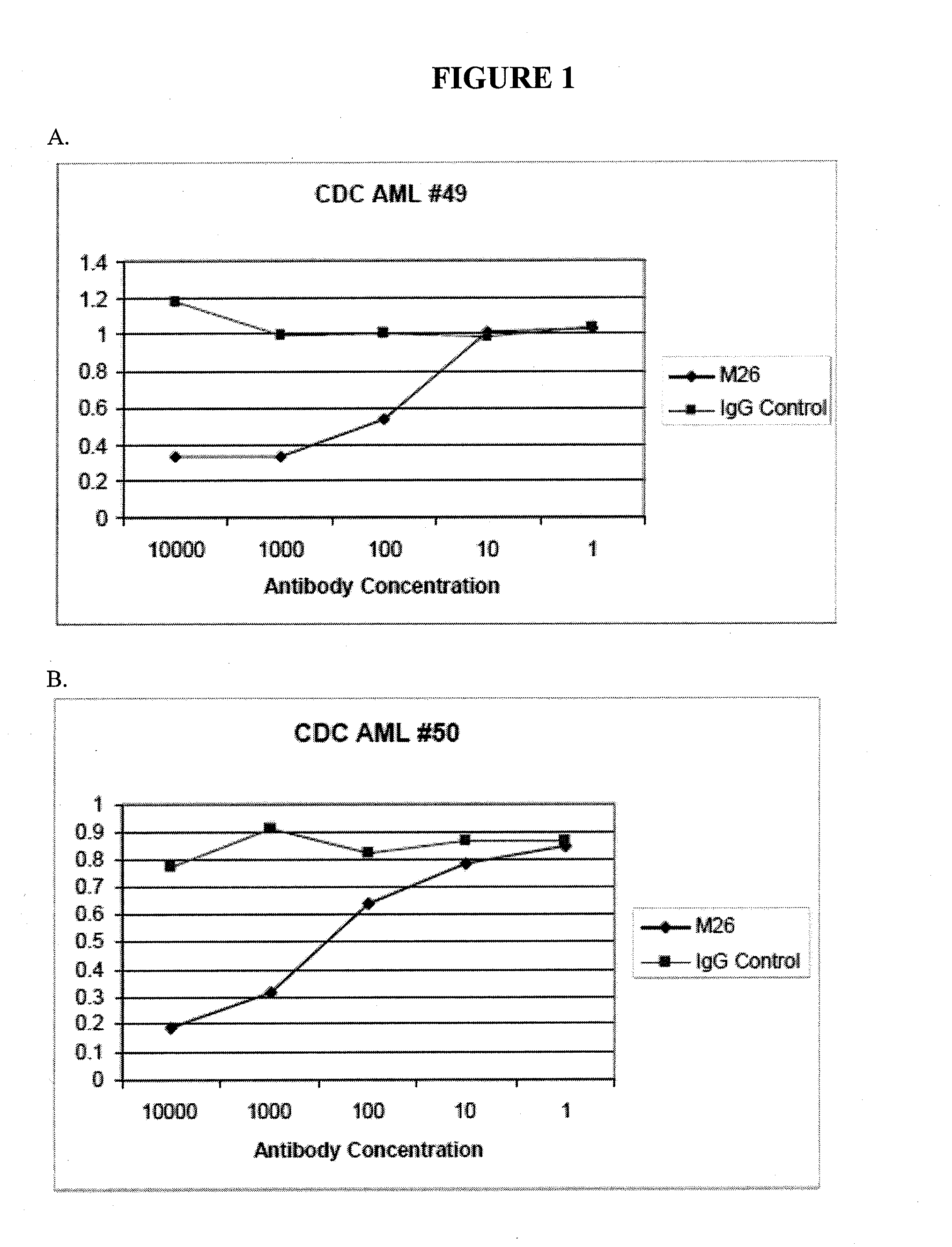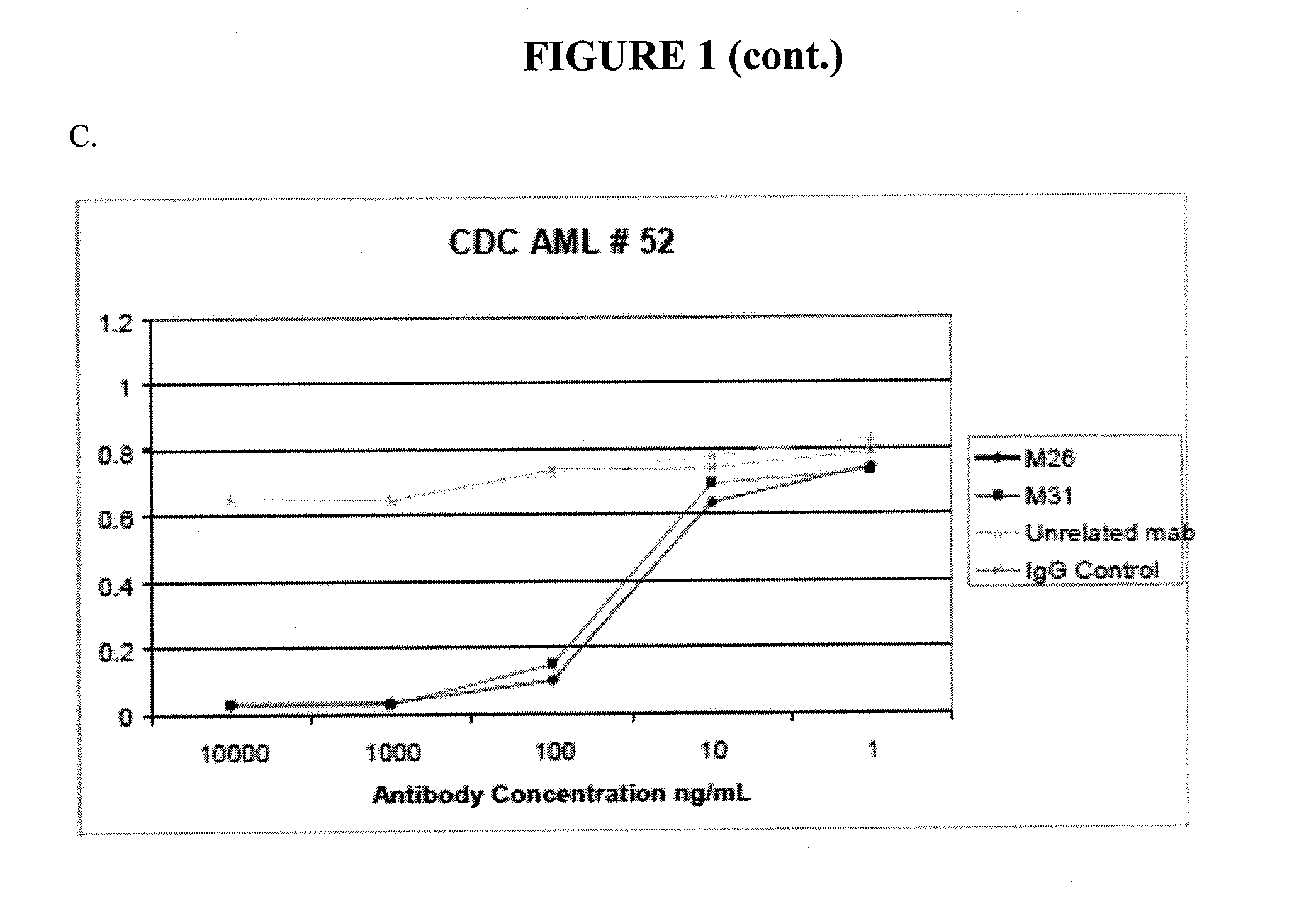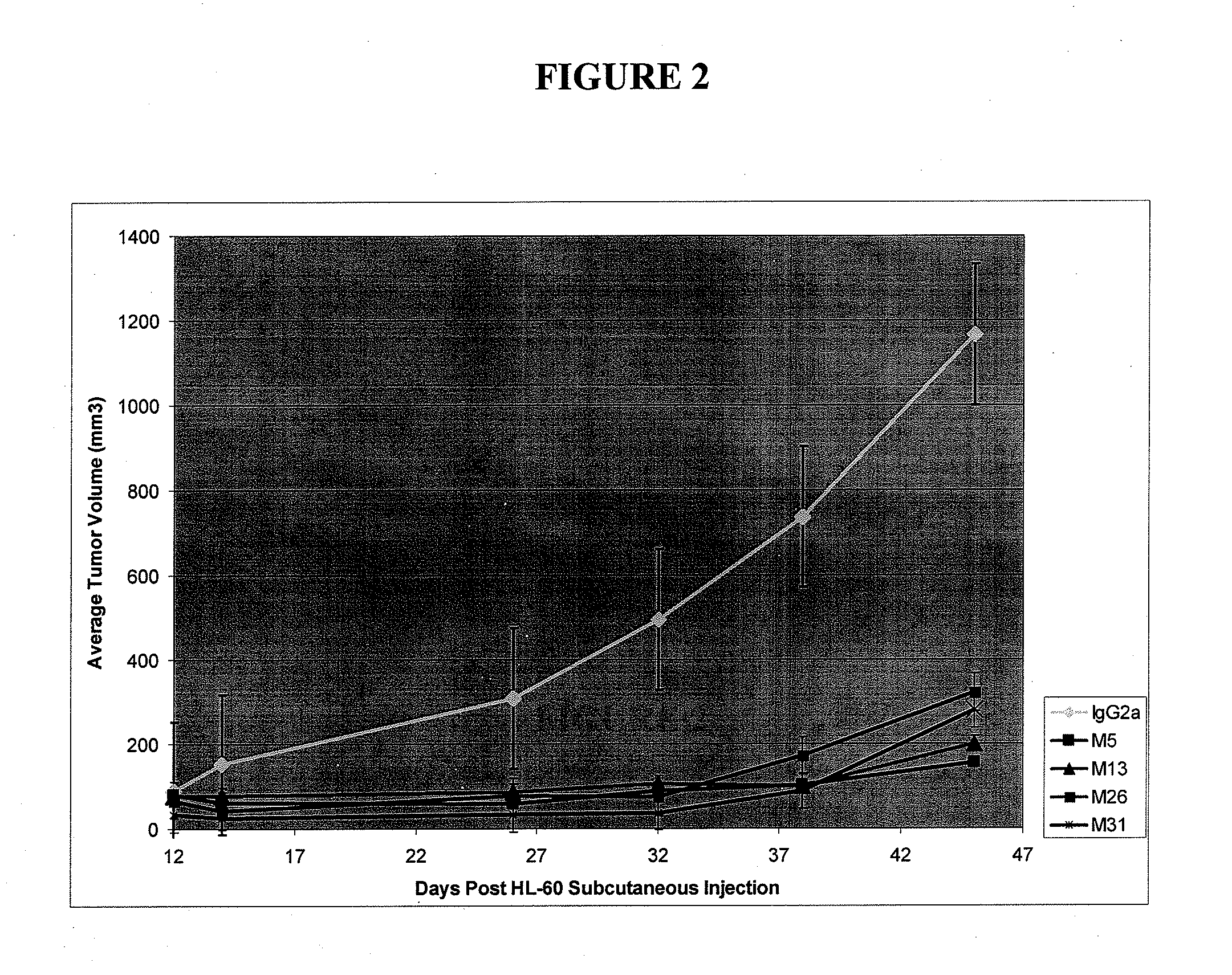Antibodies specific for cll-1
a technology of anti-cll-1 and anti-cancer drugs, applied in the field of anti-cll-1 specific antibodies, can solve the problems of not effectively eliminating cancer, all members of the major categories of antineoplastic agents have considerable toxic effects on normal cells, and the anticancer drug cannot discriminate between normal and cancer cells, etc., to reduce the formation of aml cells, reduce tumor burden, and reduce the effect of colony formation
- Summary
- Abstract
- Description
- Claims
- Application Information
AI Technical Summary
Benefits of technology
Problems solved by technology
Method used
Image
Examples
example 1
A. Example 1
Characterization of CLL-1 Antibody Sequences and Structure
[0357]Human CLL-1 was used to generate antibodies in mice. Antibodies specific for CLL-1 were selected and cloned into hybridomas for stable production of monoclonal antibodies. A number of antibodies specific for CLL-1 were cloned and characterized for sequence and antibody structure. These data are shown in Tables 1-3 below. The heavy and light chain variable region sequences are shown in the sequence listing.
TABLE 1Antibody structuresClone IsotypeVHDHJHVKJKM26IgG2bVhJ558.b14PseudoD3JH4IGKV9-124*01JK2M31IgG2aVhJ558.b14DSP2.2JH2IGKV3-10*01JK1G4IgG1VHJ558DSP2.2JH4IGKV10-96*01JK1M22IgG2aIGHV1-61*01DSP2.5JH4IGKV8-19*01JK5M29IgG1VhJ558.b14DSP2.2JH2IGKV19-93*01JK1M2IgG1IGHV1-36*01DSP2.9JH4IGKV9-124*01JK2M5IgG2a14-1-39DQ52a.1JH2IGKV8-30*01JK1G12IgG1DFL16.3JH1 IGKV3-10*01JK2
TABLE 2J sequencesCloneJ HCJ LCM26CTRDDGYYGYAMDYWCLQYAIYPYTFM31CARPIYFDNDYFDYWCQQNNYDPWTFG4CARTDDYDDYTMDYWCQQGKTLLWTFM22CAIYYGNPSYYAMDYWCQNDYSYPFTFM...
example 2
B. Example 2
Epitope Binding Studies
[0358]For certain clones, epitope mapping was carried out, and compared to the location of binding to CLL-1 for known antibodies. These antibodies include Nuvelo / X1057 (US20100285037), Crucell / X357 (U.S. Pat. No. 7,741,443), and Goat anti CLL-1. A summary is shown in Table 4 below. CLL-1 or the C lectin domain of CLL-1 was expressed in 293T cells. Non-transfected 293T cells, or 293T cells transfected with mouse CLL-1 were used as controls.
TABLE 4Epitope binding293T293T293T CClone293TmCLL-1hCLL-1lectin domainM13−−++M26−−+−M31−−+−X357−−++X1057−−++Goat anti-CLL-1−−++
[0359]The data show that clones M26 and M31 bind to human CLL-1, but that the C lectin domain is not sufficient for significant binding.
[0360]The M26 and M31 antibodies were also tested for binding to Cynomolgus monkey CLL-1. These animals can be used for clinical studies, thus it is useful to have target-specific antibodies that bind the Cynomolgus species homolog of a human antibody targ...
example 3
C. Example 3
Affinity Testing
[0362]Affinity testing was carried out for the CLL-1 antibody clones. Briefly, biotinylated CLL-1 (25 ug / ml) is loaded onto strepavidin sensor tips for 2 hours at 22C. Ab-Ag dissociation curves were generated at three different concentrations for each antibody (10, 30, and 90 ug / ml) using a global 1:1 curve fitting. The results are shown in Table 6 below.
TABLE 6Affinity Kd (pM)CloneAffinity for hCLL-1M26214M31611G453M2205M5553M13854M22388M291480M41387D11436E3447G24640G61492G8980G10194G1270G14187G162357G23543G26134G30241
PUM
| Property | Measurement | Unit |
|---|---|---|
| body weight | aaaaa | aaaaa |
| concentrations | aaaaa | aaaaa |
| concentrations | aaaaa | aaaaa |
Abstract
Description
Claims
Application Information
 Login to View More
Login to View More - R&D
- Intellectual Property
- Life Sciences
- Materials
- Tech Scout
- Unparalleled Data Quality
- Higher Quality Content
- 60% Fewer Hallucinations
Browse by: Latest US Patents, China's latest patents, Technical Efficacy Thesaurus, Application Domain, Technology Topic, Popular Technical Reports.
© 2025 PatSnap. All rights reserved.Legal|Privacy policy|Modern Slavery Act Transparency Statement|Sitemap|About US| Contact US: help@patsnap.com



